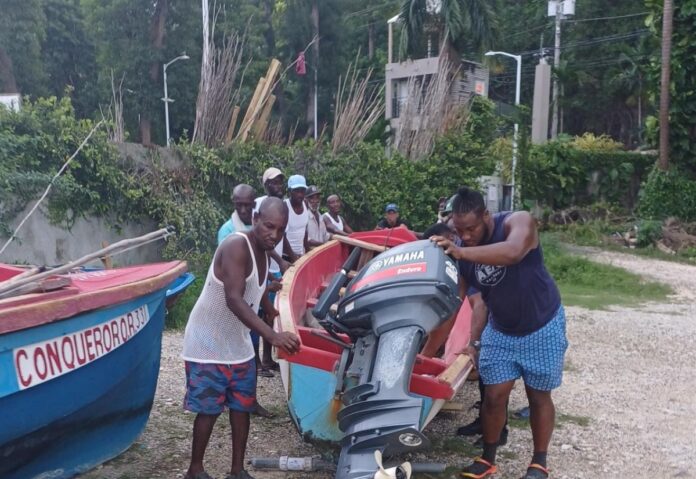 Fishermen at the Ocho Rios Fishing Village in St. Ann return boats to the water following the passage of Hurricane Melissa on October 28. Photo: JIS
Fishermen at the Ocho Rios Fishing Village in St. Ann return boats to the water following the passage of Hurricane Melissa on October 28. Photo: JISProminent Jamaican food technologist Dr. André Gordon has sounded an urgent warning about the devastating toll Hurricane Melissa has taken on Jamaica’s food supply chain, describing the impact on the island’s agricultural heartland as “severe and devastating.”
“The breadbasket, the production heartlands of Jamaica have been basically wiped out,” Dr. Gordon told Caribbean National Weekly recently.
“Westmoreland, St. Elizabeth, and Clarendon have been decimated. Not just people’s lives and homes, but the agricultural production in those areas has been severely impacted.”
Dr. Gordon, a National Medal of Science and Technology recipient and founder of Technological Solutions Limited (TSL) in Kingston, said the hurricane has crippled food production in some areas that supply the island and international markets.
 Dr. Andre Gordon, founder of Technological Solutions Limited (TSL)
Dr. Andre Gordon, founder of Technological Solutions Limited (TSL)“It’s going to take a while for people to first get themselves in a place of comfort,” he said. “Some efforts have started for replanting, but most people are trying to figure out how they’re going to survive.”
Fisheries and food exports crippled
In addition to the destruction of farmlands, Dr. Gordon revealed that the country’s fisheries sector has also been “severely affected,” particularly along the south coast.
“From Bluefields to Alligator Pond, Rocky Point, and Negril, a lot of destruction has taken place,” he said. “Jamaica produces and exports a significant amount of fisheries products, and that sector is in crisis.”
The hurricane’s blow to Jamaica comes just months after the agricultural export sector began to recover from last year’s Hurricane Beryl, which caused widespread damage.
“The sector had just started to recover in August and September,” he explained. “But with Melissa hitting Clarendon, St. Elizabeth, and Westmoreland as badly as it has, the crop is going to be decimated. It’s going to be extremely difficult for people overseas to get products like ackee.”
Dr. Gordon expressed hope that producers in St. Catherine, St. Andrew, and St. Thomas, who may have escaped the worst of the storm, can fill some of the void.
“Even if they’ve lost some of the crop, I’m hoping they’ll be able to recover much more quickly,” he said. “But it’s going to be challenging.”
Health risks from contaminated water
Melissa’s impact extends way beyond the agricultural sector. Dr. Gordon cautioned about widespread water contamination in western parishes due to damaged sewer lines and flooded farms.
“Even streams, rivers, and water sources became contaminated with sewage and waste,” he said. “There is a real risk of getting E. coli and other coliforms that cause waterborne illnesses.”
He urged Jamaicans in the affected western parishes to rely only on bottled or treated water, emphasizing that many public water sources could be unsafe.
“Whenever you have these kinds of events, the Ministry of Health issues warnings because they cannot quickly identify which water sources are contaminated and which are not,” he said.
Relief measures and the fight against scammers
Dr. Gordon praised the Ministry of Finance’s decision to waive import duties and General Consumption Tax (GCT) on essential goods brought in for relief efforts.
“It’s a very good move,” he said. “In past disasters, people seeking help were frustrated by the cost of duties. This waiver makes it easier for the diaspora and aid organizations to help.”
He also warned Jamaicans at home and abroad to beware of scammers exploiting the disaster.
“Everybody wants to help, but we have to be careful,” he cautioned. “Please ensure that any donation goes through reputable organizations like the Jamaica Manufacturers and Exporters Association (JMEA), the Private Sector Organisation of Jamaica (PSOJ), or the Jamaica Information Service (JIS). If the website doesn’t end with .gov.jm, don’t trust it.”
TSL’s role in recovery
Dr. Gordon said his company, TSL, will once again step forward to help rebuild Jamaica’s agricultural and agro-industrial base.
“When Hurricane Ivan hit in 2004, we played a major role in revitalizing and restructuring the agricultural, agro-industrial, and fisheries sectors through the Jamaica Business Recovery Program,” he recalled.
“We’ll be contacting the authorities to see how we can help structure a program to get production back—not just as it was before, but better. We must use this opportunity to build more resilient agricultural systems and help farmers access local hotels and overseas markets,” he added.
He also noted that damage to packaging and supply imports will likely slow the recovery.
“Even products like jerk seasonings and sauces will be in short supply because their supply chains have been disrupted,” he said. “The Port of Kingston only just reopened, so it will take time.”
A call to the diaspora
Dr. Gordon ended with an emotional appeal to Jamaicans overseas.
“You all love your country, and this country loves you,” he said. “This is an opportunity to help Jamaica build back better—to fix broken homes and broken lives, and help people recover mentally and spiritually. Even a kind word or any little assistance can make a difference.”
He urged professionals in the diaspora with specialized skills to get involved.
“Now is the time to contribute. Let’s build a stronger Jamaica for the future, so that if we ever face another disaster like this, we are better prepared to survive and recover.”

 3 months ago
13
3 months ago
13
 English (US) ·
English (US) ·